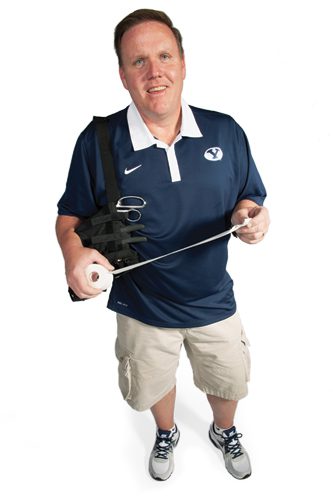As Fall sports crank up, injuries crop up. Athletic trainer A. Kevin Morris (BS ’92) has treated injured BYU athletes for 12 years. Here he shares a few prevention and treatment tips for five common injuries.
Sprained Ankle: The outside, inside, or high ankle ligaments stretch or tear. Prevention: Tape your ankle or wear a brace. Treatment: Remember RICE: rest, ice, compression, elevation. Elevate your ankle above your heart. Ice for 20 minutes, then wait an hour and repeat.
Torn ACL: The anterior cruciate ligament in your knee tears. Prevention: Those with a muscle imbalance between their quadriceps and hamstrings are predisposed to ACL tears. Your hamstrings should be 70 percent the strength of your quadriceps. Strengthen your hamstrings by lying down, putting your feet up on stairs, and digging your heels in until you lift your backside off the floor. Treatment: A torn ACL requires surgery. Neglecting it will erode knee cartilage and accelerate arthritis.
Stress Fracture: A bone is weakened from repetitive stress. Prevention: Runners who move from short- to long-distance runs too quickly are at a high risk. Gradually increase your distance. Treatment: Vary your exercise to include low-impact exercises like biking or swimming.
Plantar Fasciitis: The tissue connecting your heel and toes overextends. Prevention: Take a tennis ball and roll it under your foot to stretch and massage the foot tissues. Treatment: Wear a brace at night to keep your foot stretched in a 90-degree position.
Torn Rotator Cuff: The tendon connecting your shoulder muscles to your humerus bone tears. Prevention: Strengthen the rotator cuff by holding a weight in your hand with your arm extended in front of you and yourthumb pointing up. Then rotate your arm so that your thumb points down. If you experience pain in this exercise, see a physician. Treatment: You can get by without surgery if you don’t lead an active lifestyle, but you’ll lose strength in your shoulder.
General Prevention
Effective stretching and hydration can often prevent injuries. Stretch at the beginning, middle, and end of your workouts. Muscles stretch best at 104 degrees Fahrenheit. Do each stretch 10 times, 10 seconds each time. Drink as much water as the weight you lose while working out. For more strenuous workouts, drinking a sports beverage will rebuild your glycogen stores.










